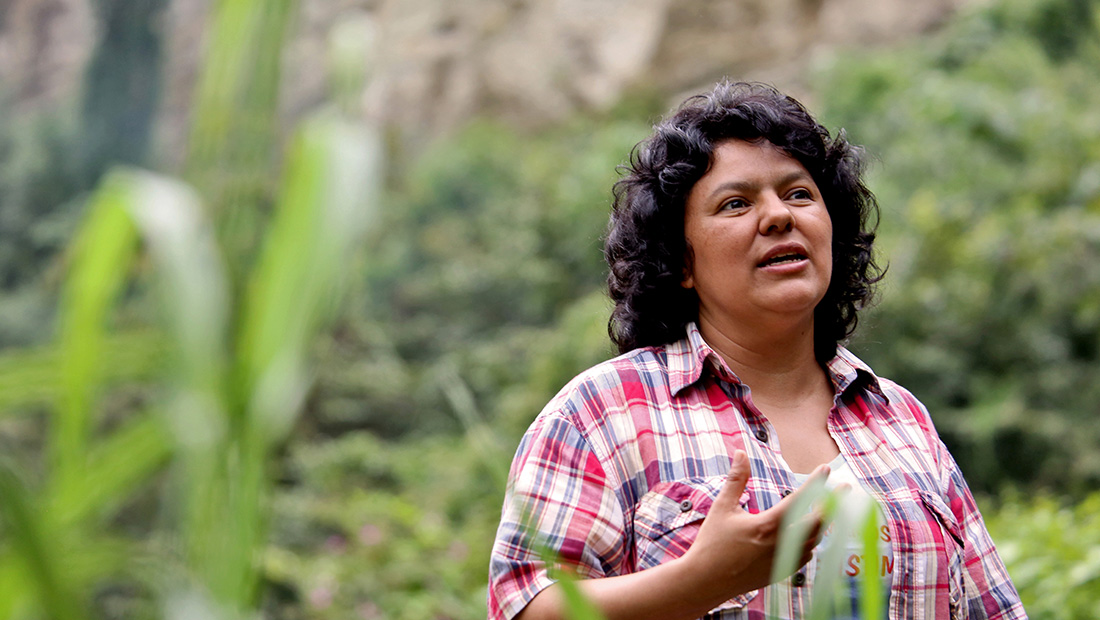On Monday, September 17, the trial of eight people accused in the assassination of Honduran indigenous, environmental and social leader Berta Cáceres will begin. Berta Cáceres was the general coordinator of the organization, Civic Council of Popular and Indigenous Organizations of Honduras (COPINH), and was leading the resistance of the Río Blanco community against a dam project sponsored by the hydroelectric company, Desarrollos Energéticos, (DESA), when she was assassinated.
COPINH has insisted since day one that the assassination of Berta was not random but highly politicized, an attempt to crush the resistance of COPINH, of the Lenca people and of the Río Blanco community so that DESA could continue with their hydroelectric project. They have pointed to cooperation between high-level members of the government, members of the state security forces and some of the most powerful families in Honduras in the crime. Due to this state participation, COPINH has demanded that the Inter-American Commission on Human Rights (IACHR) be allowed to carry out an independent investigation of the crime. However, the Honduran government rejected the plea of both COPINH and the IACHR.
An investigative panel was then formed, known as the International Advisory Group of Experts (Grupo Asesor Internacional de Personas Expertas, GAIPE) to carry out an independent investigation about the circumstances surrounding Berta’s assassination and years of threats, hostility and attacks suffered by the indigenous leader and her organization. The report concluded that Honduran state agents and senior executives of DESA colluded in “the planning, execution and cover-up” of her assassination.
COPINH has denounced that at every step, the Honduran state has tried to depoliticize and decontextualize Berta’s assassination. The state’s measures include denying the legal status of victimhood to COPINH, rejecting evidence which implicated high-level executives of DESA and members of the powerful Atala family and rejecting an official expert analysis of the context, among other things. COPINH has also condemned the Honduran state for fostering a hostile and racist environment, re-victimizing members of Berta’s family and members of COPINH by restricting their ability to speak at the pre-trial hearings and enter the courtroom itself, and levelling serious accusations against Berta, COPINH and its members, making it seem as if they were the ones on trial.
Due to the irregularities, delays and the hostile environment, COPINH has requested the presence of international observers and organizations in the court proceedings. On Wednesday, 17 international and national organizations and experts in human rights and international law announced the creation of a mission to observe the trial and ensure it is carried out in line with international and national legal standards. The members of this mission are from Spain, France, Canada, the United States, Guatemala, Costa Rica and Honduras.
Monday marks the beginning of a process of justice that will probably last for years. COPINH seeks to set a precedent with the trial and their demand for full justice: the rich and powerful will not enjoy lifelong impunity when they kill activists who stand in the way of their capitalist projects. The people will have justice!
Some of the people who will be on trial as of Monday include:
Douglas Geovany Bustillo: chief of security of the President of Congress (2003-2005), Lieutenant of the Fifth Batallion of the National Army of Honduras (2004-2006), Chief of Security of DESA until June 2015. He was in charge of coordinating directly with David Castillo (President of DESA), with the state security forces and paramilitary groups to carry out surveillance, infiltration, attacks and arrests of members of COPINH. He led the failed assassination attempt of Berta Cáceres on February 5 and 6, 2016. He also planned, supervised and directed in real time the operative on March 2, 2016 where Berta Cáceres was assassinated and they attempted to assassinate Gustavo Castro.
Mariano Díaz Chávez: the intelligence official of Special Honduran Forces involved in the plan to assassinate Berta Cáceres. During the time of the assassination he was under investigation for kidnapping and drug trafficking. Major Díaz was personnel officer in the 15th Batallion in the Bajo Aguán Region in 2012 when trainings were held with the Southern Command of the Special Operations of the United States. He helped train the Honduran Military Police for Public Order.
Sergio Rodríguez: the social, environmental and communications manager of DESA, in charge of infiltration and community disintegration in Río Blanco. He worked closely with the other accused and employees of DESA to monitor and surveil the activities of Berta Cáceres and the other leaders of COPINH by paying off community members to infiltrate COPINH activities.
Henrry Javier Hernández: part of the 15th Battalion under the command of Major Mariano Díaz. In 2013, he worked for the private security forces of the palm oil company DINANT who were accused of participating in a campaign of selective assassinations of leaders.





